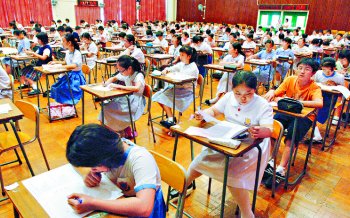News and Events
If you wish to take the IBDP, but have doubts on supplementing your studies to best prepare for it, you have come to the right place. Explored in this three-part publication will be information that will be useful in giving you the best chance to excel.
Today, around 30 international and double-pathway schools in Hong Kong offer the IBDP as an alternative to the DSE program. However, the bridging courses they offer differ from one another.
For example, St Paul's Co-educational College, Diocesan Boys' School and the HKCCCU Logos Academy all offer self-designed pre-IB program courses to equip their students.
Alternatively, some schools under the English Schools Foundation, such as West Island School, South Island School, Island School (yes, they're all different schools) and Shatin College will offer the IGCSE to prepare their students for the challenges of the IBDP. Some other international schools, such as the German Swiss International School also adopt the IGCSE from Years 10 to 11. This means that students might be given the proper groundwork prior to taking on the IBDP, since the IGCSEs are known as a stepping stone, whereupon students can get a taste of the materials they could be learning prior to the IBDP.
Other schools offer the IB's own program, the Middle Years Program. The schools who offer this educational pathway include Victoria Shanghai Academy, Renaissance College (also under the ESF), and Creative Secondary School.
So how should students make their choice?
I believe a plethora of factors have the potential to affect a student's ability to do the spadework for the academically challenging, yet intellectually stimulating IBDP.
One must first consider how all the above programs include a vast array of different academic subjects. Subjects selected by students are also generally similar to the IBDP, which means students gain a strong background of prior knowledge to tackle challenges within the program.
Chosen by students themselves, these subjects will allow individuals to recognize what they are most academically interested in and inclined towards.
Lastly, the IBDP uses exam based grading systems. These pre-IB programs, which all offer exam graded assessments, can allow students to familiarize themselves with exam conditions and etiquette.
This raises the important question: which course will equip students with the most solid foundation?
It is somewhat reassuring to know that the schools who offer their own pre-IB programs often produce top scorers within the IBDP worldwide.
Students in Hong Kong boast the title of the second highest average scorers globally in the IBDP.
Diocesan Boys' School and St Paul's Co-educational College in particular are home to the world's first and second highest scoring school population, respectively.
Of course, one should expect that the method of teaching differs between schools, and it is indubitable that teachers will do their best to accommodate students of different standards.
Regardless, parents should pay close attention to the teaching methods of each school in order to pick what is best for their child.
To make a more informed decision prior to enrollment, parents can communicate with their choices of school about their teaching ethos and learning environment, while also including their child's opinions about their learning style and academic strengths.
Schools which elect to teach using the IGCSE program often produce students who have the most rigorous study schedules and habits, since each student can study anywhere from six to 12 subjects at once during their pre-IB years.
The subjects taught are often more traditional - such as English literature, maths, physics, chemistry, biology, economics, geography and history.
Nevertheless, many of these subjects contain transferable skills and knowledge towards the IBDP, and will make an excellent choice for students looking to craft a solid foundation of prior knowledge.
In addition, IGCSE students are graded under traditional, standardized, open examination methods and conditions. What this entails is that the taught curriculum will stay relatively similar for most students, and large changes won't be made which can affect the quality of teaching. As the IGCSE is a widely internationally accredited program, rest assured that students partaking in the IGCSE will receive a solid educational background through this pathway.
As for the Middle Years Program, it will be discussed in the next part of this publication.
https://www.thestandard.com.hk/section-news/fc/14/252039/Building-a-bridge-to-the-IB





